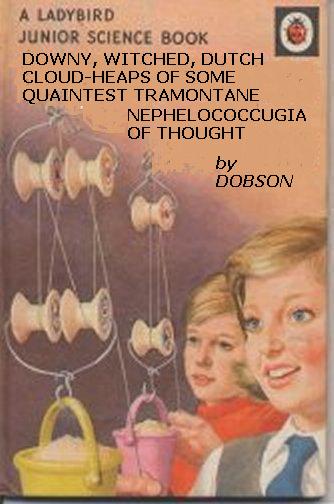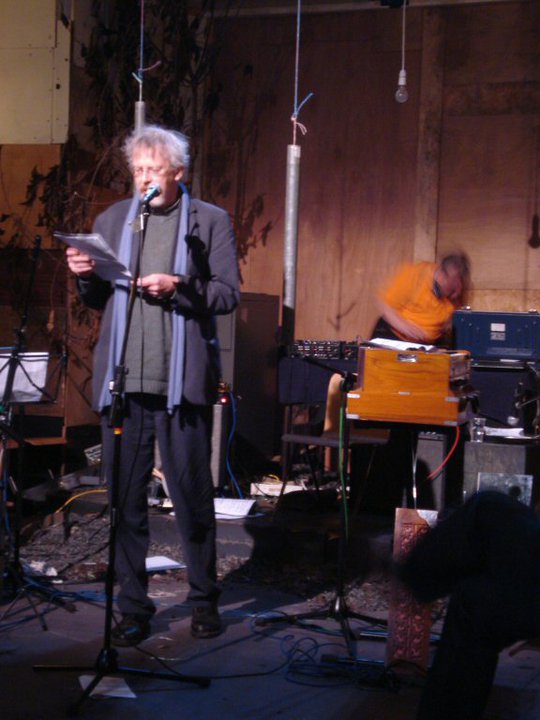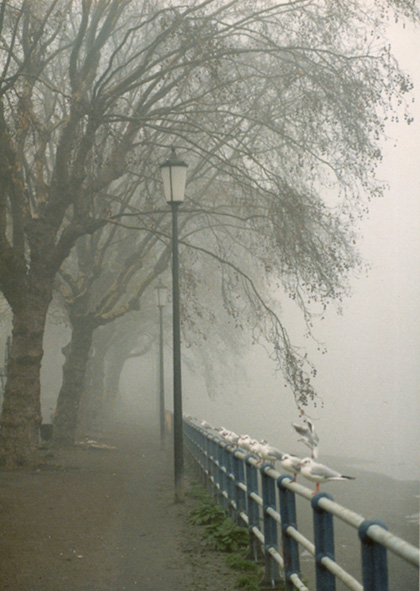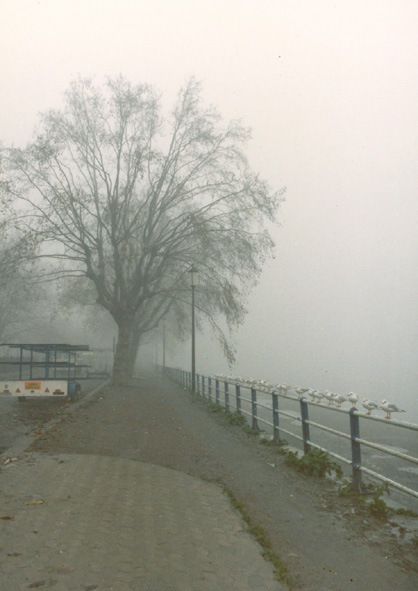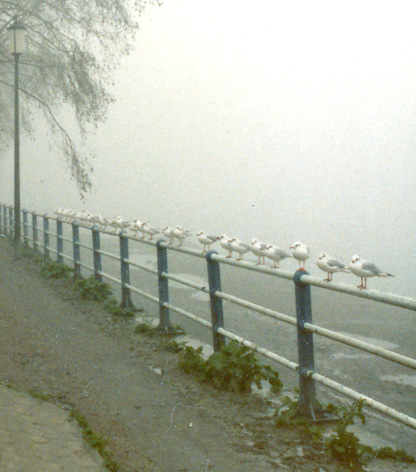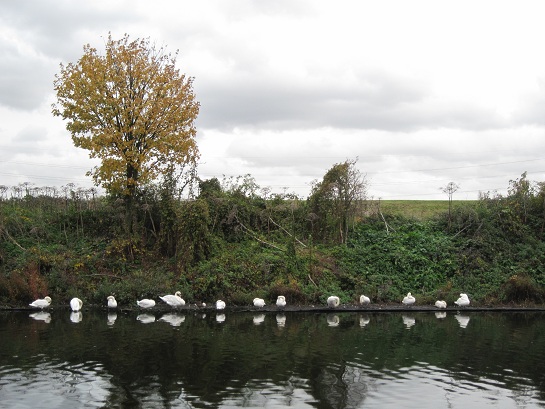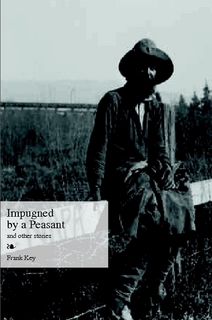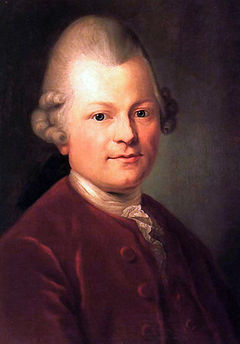It is rather quiet at Hooting Yard at the moment. Partly this is because I am recovering from the ague which felled me last week, and partly, I think, because I am reading a stout collection of short stories by M P Shiel. It is two decades since I last immersed myself in the works of that master of purple prose, but I am a sensible person, and, as Rebecca West so wisely said, “Sensible people ought to have a complete set of Shiel”. I do not own such a set, but that may be a small mercy. Reading Shiel may not exactly fuddle the brain, but I must be very careful not to try to imitate his highly-wrought outpourings when tippy-tapping my own prose. Long-time readers may recall what happened to Dobson when he fell under Shiel’s spell…
Monthly Archives: November 2010
With Lepke B. At The Jellyfish
Here is a sound recording of what will come to be known as “the legendary Jellyfish session”, when Lepke B. and I performed at the now-demolished theatre in October. In the accompanying snap, Lepke is but an orange blur, but this is hardly surprising given the dizzying physical manoeuvres he adopts when plying his art. The voice you hear introducing us is the Benevolent Dictator of ResonanceFM, Ed Baxter (as featured in The Independent On Sunday Happy List 2009).
Listen here
Dabbling With Liszt
 Gritty historical realism in Key’s Cupboard at The Dabbler this week, where I present a reconstruction, based upon impeccable source material, of an episode in the life of Franz Liszt. The reader is transported, as if by magic, to nineteenth-century Rome, and an assignation between the newly-ordained Abbé Liszt and his Russian-born lover, Princess Carolyne von Sayn-Wittgenstein…
Gritty historical realism in Key’s Cupboard at The Dabbler this week, where I present a reconstruction, based upon impeccable source material, of an episode in the life of Franz Liszt. The reader is transported, as if by magic, to nineteenth-century Rome, and an assignation between the newly-ordained Abbé Liszt and his Russian-born lover, Princess Carolyne von Sayn-Wittgenstein…
Friendly Sea Creatures
An unforgettable headline…
Porpoises rescue Dick Van Dyke
and the standfirst is also a thing of beauty…
Mary Poppins star feared death after apparently falling asleep on his surfboard but friendly sea creatures pushed him to shore
Important Badger With No Head Update
On Sunday, you will recall, I expressed the hope that Samuel Wesley’s haunting by an apparition of a badger with no head would inspire Bob Drake to craft a song. And lo! it came to pass.
Here is a picture of Bob delicately wrenching a chunk of metal from a cymbal using a pair of bolt cutters, and here is his song.
Self-Tidying Gulls
Last week we looked at self-tidying swans, and we can now extend our ornithological researches courtesy of Johnny Seven. Mr Seven, incidentally, is a man to whom you should be profoundly thankful. Not only does he present the excellent “Pull The Plug” show on ResonanceFM, but he is currently the sound engineer charged with making sure Mr Key’s dulcet tones are transmitted into your ears every week.
Long, long ago, in the last century, Johnny snapped a gang of self-tidying seagulls. He writes: “Taken on Tuesday 10th December 1984 (I know this since it’s written on the back of the photographs), I was interested in the slate-grey blanket of fog shrouding the trees on the embankment in Putney. No sooner had I set up the tripod than the hungry birds came (picture no.1). See their expectant little faces. Imagine their disappointment when croutons were not scattered. I moved further back to get a wider (and, to be honest, less pleasingly composed) view, and the gulls moved further up the railing toward me, increasing in number (picture no.2, and detail).”
You will note that, unlike the self-tidying swans, these self-tidying gulls are not accompanied by an equal number of water gulls. This is due to their choice of emperchment, upon railings, if, indeed, it was a conscious choice. Who can say what weird shenanigans occur in the tiny brains of birds? One thing we can be sure of is that they know how to line up very neatly, with the precision for which self-tidying gulls are applauded, in some circles.
Four Uncanny Tales
Here are four stories, each of a hundred words. Earlier versions, a little shorter or longer, can be dug out from the Archives should you care to look.
I
I was sitting on a bench in a bower on a bright summer’s day. It was a Wednesday, or possibly a Thursday, in August, in the year after the Kennedy assassination, far far away in Dallas, and the air was heady with verbena, and hollyhock. I was eating my snack. All of a sudden, gruesome suppurations of foul-smelling extraterrestrial hideousness began oozing from my marmalade and fish-head sandwich, and I swooned. When I came to, I had a tiny radio transmitter implanted in my forehead, but I remained unaware of it for the rest of my sordid and sorry life.
II
They called him Blomqvist, and he was the village wrestler. He lived in a room above the post office. No other living being ever set foot in the room until the day Blomqvist died. They found him lying on his bed, as if he were asleep, but there was no doubt that he was dead, for hovering above his chest was a baleful phantom, emitting gruesome suppurations of foul-smelling extraterrestrial hideousness which it poured into a funnel inserted into Blomqvist’s right ear. They closed up the room and nailed the door shut. It remained unopened for the next hundred years.
III
The bell tower had bells in it, but that was not what caught the attention of Jarvis, the bird scientist.
“Look, there is a bird on the bell tower,” he said to his pneumonia-racked assistant Cubbit, who was doing something foolish with a pair of bicycle clips.
Jarvis pointed at the bird, expecting Cubbit to look, but the spindly youth was distracted by a passing pantechnicon all a-clatter with pots and pans. It was the neighbourhood Windy Man, on his rounds, and spookily, sitting next to him in the passenger seat, was a hideous extraterrestrial being, suppurating, greasy and malevolent.
IV
“Hand me that chaffinch, Cubbit,” said Jarvis to his lantern-jawed assistant. Jarvis was a bird scientist, devoted to the study of chaffinches. Wandering the hills, he had spotted one. As Cubbit picked up the chaffinch, he heard a scream. Spinning round, he saw Jarvis being engulfed by a gruesome suppurating monster. The poor lad scampered back to the lab and told what had happened to Mrs Purgative.
“Well! I never heard of such a thing!” she exclaimed. She hoisted her mop on her shoulder, took Cubbit by his withered hand, and led him far away, all the way to Gondwanaland.
A Badger, With No Head
I am having one of my occasional bursts of activity on Facecloth, the social networking site. Temperamentally, a Diogenesian recluse such as myself would be better suited to an antisocial network, but needs must when the devil drives, as they say. Yesterday I posted on Facecloth a snippet which fits neatly into the Hooting Yard “Things I Have Learned” category, and it elicited a couple of comments in reply which are worth sharing with a wider audience.
I learned, from Peter Ackroyd’s new book The English Ghost : Spectres Through Time, (and I quote from my paraphrase at Facecloth):
On Christmas Day 1716, Samuel Wesley (father of John Wesley) was haunted by an apparition of “a badger, with no head”. It was called Jeffrey.
This is something I am very, very glad to know, and I doubt that a Yuletide will pass in future without me mentioning it.
Bob Drake replied, saying “That got me thinking. Would I rather be haunted by a badger’s disembodied head, or a badger’s headless body? I can only conclude that it would depend on the temperament of the partial apparition”, while Roland Clare picked up the echo of Jubilate Agno, and suggested: “For I Will Consider My Headless Badger Jeffrey …”
It is my fond hope that Mr Drake will be inspired to write a song on the subject, and Mr Clare will essay a badgerised version of the pertinent section of Christopher Smart’s poem.
Apish Pranks In Weobley Parish
“There is a farm in Burton, a village in the parish of Weobley, which Mr William Bridges, a linen draper of London, has in mortgage from one Thomas Tomkyns, a decayed yeoman. This farm was taken in by lease of Mrs Elizabeth Bridges, about Michaelmas 1669. Soon after this tenant was entered on the farm, some familiar began to act apish pranks by knocking boldly at the door in the dark of the evening, and the like early in the morning, but nobody to be seen. The stools and forms [benches] were thrown into disorder, heaps of malt and vetches mingled, a mow of pulse and pease likewise; loaves of bread on a table carried into another room, or hid in tubs covered with cloths; cabbage plants dug up and replanted in various patterns; a half-roasted pig demolished except for the bones; some cattle died and among others a sow leaped up and danced in strange postures, and at last fell down dead.”
Account of a seventeenth century poltergeist, quoted in Peter Ackroyd, The English Ghost : Spectres Through Time (2010)
Self-Tidying Swans
Here is Mick Hartley‘s delightful snap of thirteen swans, very neatly lined up in a row. They are what we know as self-tidying swans. I checked the Swan Register and can confirm that they are, from left to right, Alcibiades, Blinky, Clovis, Digby, Eggbound, Flapper, Gertrude, Hoddinott, Icebrain, Jim, Krakatoa, Lars and Monique.
Their reflections in the pond or mere or lake or gigantic puddle are self-tidying water swans, that is, swans made of water, which wobble and shimmer, and resist capture. From right to left, according to the Water Swan Register, they are Nat, Olive, Popsy, Quetzalcoatl, Rex, Succubus, Totteridge, Ubuntu, Vincenzo, Whetstone, Xantippe, Yoko, and Blodwyn.
The fact that Blodywn’s name is Blodwyn, rather than something beginning with Z, suggests that she may not be a self-tidying water swan, but rather an interloper. Such swans are commonly termed anomalous untidy water swan interlopers. There is no standard Register listing them, although volunteers who can devote a few hours per day to the compilation of such a Register are always welcome. You will need to be able to tell the difference, at a glance, between a swan and a water swan and other avian life-forms that paddle upon inland bodies of water.
Remember, Remember, Re Dabbler
 In my cupboard at The Dabbler this week, I have transcribed the words of a children’s song appropriate for today’s date.
In my cupboard at The Dabbler this week, I have transcribed the words of a children’s song appropriate for today’s date.
The song is taken from a garish publication of the last century entitled Special Agent Rastus Blot’s Traditional Songbook For Winsome Tinies. It was a piece of spectacular self-aggrandisement by Blot. Though the songs purport to be much-loved chants and ditties sung by billions of children around the world, they were all in fact devised by the Special Agent himself, and feature him in a starring role, carrying out deeds of daring and bravado. When I did some research into the matter, I discovered that not one tiny has been heard singing any of these songs, anywhere, ever.
Quite frankly, if you are going to present an urchin with a book as a gift, I would give Special Agent Rastus Blot’s farrago of nonsense a wide berth and buy Impugned By A Peasant & Other Stories instead.
Marketing Ploy
In 1922, Charles Ives self-published his collection of 114 songs. Now, almost one hundred years later, Mr Key has self-published a collection of 114 stories. Yes, at last, wrenched from the innermost core of his creative innards, Impugned By A Peasant & Other Stories is available for you to buy, to fawn over, to stroke tenderly with your fingertips just like Christopher Plummer as Atahualpa in The Royal Hunt Of The Sun, in dazzling sunlight, strokes the Holy Bible. Or you may prefer to keep your copy locked away in a lead-lined cabinet, submerged in a pit, cordoned off by an electric fence patrolled by wolves and hogs. It’s up to you, really. The important thing is that you buy as many copies of the book as a sensible person would, what with Christmas coming up, and all those birthdays and anniversaries and saints’ feast days on which you will want to present your nearest and dearest with a treasurable gift. So get with the programme, readers, and hike over to Lulu at once to make your purchase!
Words o’ Wisdom
“Hrrurr gretsch pfftdf, Wagtail, mrmpgghaw (cough) azzerbunmhher, Swan”
Reported by Ian Vince in The Dabbler.
Wolfenbüttel Footnote
Readers who keep track of these things will know that I am fond of Horace Walpole’s coinage “bewolfenbuttlement”, recently noted in my cupboard at The Dabbler. I have today learned that Gotthold Ephraim Lessing, that great figure of the Enlightenment, was for some years the librarian at the Herzog-August-Bibliothek in Wolfenbüttel. In the 1770s, he published, anonymously, the Wolfenbüttel Fragments, essays by the (deceased) Professor of Oriental Languages at Hamburg, Reimarus, questioning the status of miracles recounted in the Bible.
His skepticism in this regard means Lessing is one of the few European thinkers who has a ditch named after him. It is an ugly, broad ditch, but, disappointingly, is a theoretical ditch rather than a real one.
He also had an interestingly egg-shaped head.
The Monkey House Incident
Scene One. The Monkey House at Central Park Zoo, New York, on the 16th November 1906. A FOREIGN GENT and a RESPECTABLE LADY are standing by the cage of KNOCKO THE MONKEY.
FOREIGN GENT : Good morning, madam.
RESPECTABLE LADY (Turning to look at him) : Why sir, you are like unto a sun god! Your light obliterates your surroundings! But do you always keep your hands in your overcoat pockets when addressing a respectable lady?
The FOREIGN GENT moves towards the RESPECTABLE LADY and “annoys” her. Or possibly not.
Enter the NEW YORK COP.
NEW YORK COP : (To the FOREIGN GENT) : I’ve had my eye on you, chum. You’re under arrest!
KNOCKO THE MONKEY looks on, while monkeying about in his cage.
*
Scene Two. The police cells, later that day. The FOREIGN GENT is weeping loudly.
Enter HEINRICH CONREID, Director of the New York Metropolitan Opera.
FOREIGN GENT (Still weeping) : Thank heaven you have come!
HEINRICH CONREID : Don’t you worry about a thing. I have posted bail. Do you think for one minute I would allow Enrico Caruso, the finest Italian tenor of them all, to languish in prison?
*
Scene Three. The courtroom, a week later.
PROSECUTING COUNSEL : Tell us what happened, officer.
NEW YORK COP : This foreign gent was “annoying” several women and girls in full view of Knocko The Monkey in the Monkey House. He has slits in the pockets of his overcoat. Enrico Caruso, that is, not Knocko.
PROSECUTING COUNSEL : It is because of the crowd of moral perverts and dogs and curs out there in the courtroom who come here to listen… Our mothers and our sisters are not safe in the streets; they cannot go about without being subjected to insult by this scum from the lazaretto of Naples.
JUDGE : (To the FOREIGN GENT, who is indeed famous tenor Enrico Caruso) : Guilty as charged. I fine you ten dollars.
*
Scene Four. The Fire Station, later.
ALFRED M DOWNES (Thinking aloud) : This monkey house incident and the subsequent legal palaver has stirred public interest in Knocko The Monkey. He may have been one of the monkeys kept as mascots by the Fire Department until their disruptive antics meant they had to be removed to the zoo. I think I will take advantage of the brouhaha and write a book called Firefighters And Their Pets. It should be ready for publication by next year.
Curtain.
Further reading at The Believer.

